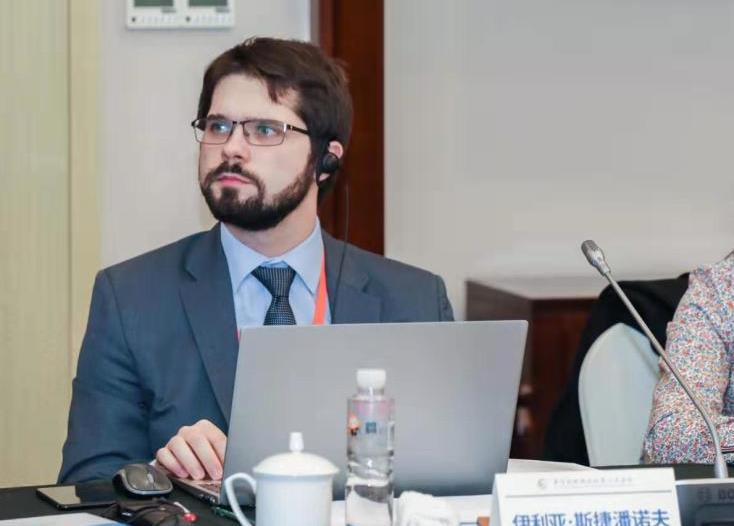Climate Change: Big Challenges for the Global Economy

Participants of the discussion ‘Trading in Allowances for GhG Emissions at Sub-national Level: Ways to Use International Best Practices in Russia’ analysed how the emissions trading system will work and what place nuclear power will occupy in the carbon-free world. The event was held as part of the session ‘Problems of Decarbonization of the World Economy’ of the XXIII Yasin (April) International Academic Conference.
Igor Makarov, session chair, Head of the School of World Economy at the Faculty of World Economy and International Affairs, opened the dialogue, noting that over the past two years, decarbonization has unquestionably been one of the priorities of Russian economic development. He added that recently, an intergovernmental group of experts presented a regular report on the economics of climate change and reducing greenhouse gas emissions.

The conclusions of the report reflect the amount of scientific knowledge that has been accumulated in recent years: ‘Nevertheless, it includes important theses in a fairly concise form. One of them states that if we want to keep temperature growth on the planet to a level of no more than 1.5 degrees Celsius compared to the pre-industrial period, this means that in the next decade, we’ll need to emit no more greenhouse gases than we have in the current decade.’ In other words, the challenges for the global economy are huge, and it is clear that society will have to face these challenges, he adds.
In November 2021, Russia adopted a strategy of social and economic development with a low level of greenhouse gas emissions until 2050. It aims to reduce greenhouse gas emissions by 80% by 2050 compared to 1990 levels and to focus on achieving carbon neutrality of the Russian economy by 2060. A particular focus in achieving these goals involves dedicated measures for the economic regulation of greenhouse gas emissions, says Igor Makarov.
Ilya Stepanov, Research Fellow at the Centre for Comprehensive European and International Studies of the Faculty of World Economy and International Affairs, believes that economic regulation of greenhouse gas emissions, including using the emissions trading system (ETS), is becoming an increasingly common element of the climate policy of different countries and regions every year. He adds that Russia can apply international experience of permit trading for greenhouse gas emissions at the regional level.

‘The popularity of the emissions trading system as a tool for regulating greenhouse gas emissions (in 2019, 8 new systems were launched across the world) grows due to the effectiveness of the integrated economic mechanism,’ says Ilya Stepanov. ‘The application of ETS gives companies the opportunity to choose the most affordable ways to reduce emissions, including purchasing permits from other companies, which reduce emissions for a cheaper price.’
Stapanov adds that today, there are 27 carbon regulation systems in the world at regional levels. Twenty of them operate in the form of ETS, and the other seven take the form of a carbon tax. Another 13 regions are planning to launch a carbon regulation system in the near future.
‘One of these systems will be ETS in the Sakhalin region. It will contribute to achieving carbon neutrality in the region by 2025. The Sakhalin ETS is intended to become a platform for testing the permit-trading mechanism for further expanding the project at the national level and in other Russian regions,’ he adds.
Ilya Stepanov notes that the implementation of the project is aimed at identifying opportunities for applying international experience in the regional regulation of greenhouse gas emissions in Russia, in particular within the framework of the emerging Sakhalin ETS.
Svetlana Vanina, visiting lecturer at the HSE Faculty of World Economy and International Affairs, spoke about the role of hydrogen-nuclear energy in the context of the modern climate agenda. She says that amid forecasts involving the transformation of the global energy balance and an increase in the share of renewable energy sources up to 30% by 2050, nuclear energy retains a stable position as a ‘clean’ primary source for a wide range of synthetic energy carriers. ‘Additional prospects for nuclear energy are determined by its ability to flexibly integrate into power systems of various scales,’ says Svetlana Vanina. In other words, nuclear energy can play an important role in the world community’s transition to green energy. For example, one advantage of the nuclear industry is that a controlled nuclear reaction is currently the only industrially utilised technology that allows humanity to provide energy for many years to come.
Representatives of the Institute of Economic and lndustrial Engineering of the RAS Siberian Branch, NOVATEK, King Abdullah Petroleum Studies and Research Center (Saudi Arabia) also took part in the discussion.
Igor A. Makarov
Head, School of World Economy
Ilya A. Stepanov
Research Fellow, CCEIS Asia-Pacific Department
See also:
Applications to Participate in April International Academic Conference Now Open
HSE University is now accepting proposals to present academic reports at the XXVI April International Academic Conference named after Evgeny Yasin. Applications can be submitted until December 16, 2025. The conference events will take place mainly on-site in Moscow from April 14 to 17, 2026.
24 Countries Represented at 25th Yasin International Academic Conference Held by HSE University
The Programme Committee of the 25th Yasin (April) International Academic Conference on Economic and Social Development has summed up the initial results. In 2025, 1,384 people from 24 countries and 29 Russian regions participated in the conference, with 335 of them delivering presentations.
Stuck in the Net: How Much Time Children Spend Online
On average, a schoolchild spends 48 hours a week on studies—equivalent to a six-day working week for an adult. This was highlighted by experts at the round table ‘Domains of Children’s Well-Being Evaluation for Human Potential and Evidence-Based Social Policy Development,’ held as part of the 25th Yasin (April) International Academic Conference.
Russian and Chinese Scholars Share Experience of Transformation of Doctoral Education
The Russian and Chinese postgraduate education systems originally borrowed their institutional frameworks from the Soviet Union. However, in the 21st century, they have evolved along different paths. While key performance indicators for postgraduate programmes in Russia are declining, China is seeing a rapid increase in the number of postgraduate students. These contrasting trajectories and the reforms undertaken in each country in recent decades were the focus of a roundtable discussion held as part of the 25th Yasin (April) International Academic Conference.
Nobel Laureate Proposes Solution to Markov Equilibrium Problem
In dynamic games, a Markov equilibrium involves strategies that guide players' behaviour based on the current state of the game, rather than its entire history. This approach is effective when players have access to complete information. But when uncertainty arises in the game—for instance, when players are unsure of who they are dealing with—this approach can become problematic. Eric Maskin, Nobel Laureate in Economics and Professor at Harvard University, addressed this issue in a paper presented at the XXV Yasin (April) International Academic Conference on Economic and Social Development held at HSE University from April 15 to 18, 2025.
‘The World Is Becoming More Complex and Less Predictable’: What Scientists Say about the Future
The future is now more difficult for researchers to forecast, and events that are hard to predict are playing an increasingly significant role. But there is good news too: scientists are confident that humanity will adapt to any changes. This was the focus of discussion at the International Symposium ‘Foresight in a Rapidly Changing World,’ which took place as part of the 25th Yasin (April) International Academic Conference.
Fragmentation and Bloc Formation: How the Global Economy is Changing
Sergey Dubinin, former head of the Bank of Russia and Professor of Finance and Credit at the Faculty of Economics at Moscow State University, has delivered an honorary address at the XXV Yasin (April) International Academic Conference. He spoke about the transformation of the global monetary and financial system, as well as the Russian economy.
More Children, More Happiness: HSE Experts Study Impact of Number of Children on Russians' Assessment of Happiness
Russians with children feel happier than those without children. At the same time, the number of children influences the assessment of happiness: the more children Russians have, the happier they feel. These conclusions were outlined inthe report ‘More Children, More Happiness: The Impact of the Number of Children on Russians’ Assessment of Happiness,’ presented at the XXV Yasin (April) International Academic Conference on Economic and Social Development, held on April 15–18 at HSE University. The study was conducted by Elena Churilova, Senior Research Fellow, and Dmitry Jdanov, Chief Research Fellowat HSE International Laboratory for Population and Health.
HSE Expands Cooperation with Gulf Countries
HSE University and the Centre for International Policy Research (Qatar) have agreed to collaborate in the field of social sciences, with plans for joint research, academic exchanges, and regular expert engagement. The agreement was signed during the roundtable ‘State Capacity and State Resilience in the Global South,’ held as part of the 25th Yasin (April) International Academic Conference at HSE University.
‘We Grow Old before We Become Rich’: How BRICS Countries Can Achieve Economic Growth
Due to population aging, many countries aiming for economic prosperity have limited time left to undergo economic transformation, according to the honorary report Narratives Versus Reality on Employment and Demography: How Undermining Institutions Can Push Countries Out of the ‘Narrow Corridor’ by Santosh Mehrotra of the University of Bath. The report was presented at the XXV Yasin (April) International Academic Conference.


